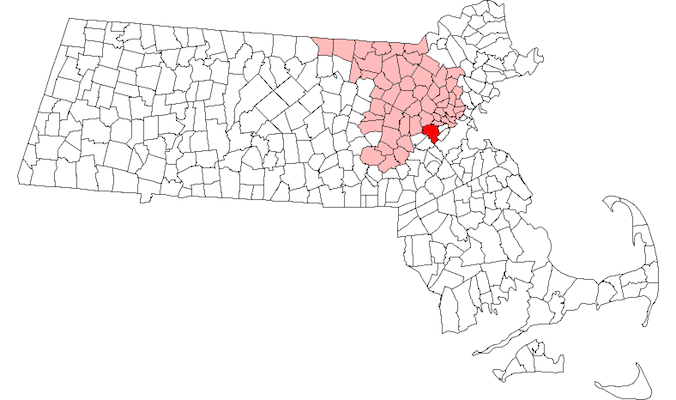Editor’s note: This is more or less a purely local post about politics in Newton MA (where we record our weekly radio show), but it has broader implications for both eastern Mass and other parts of the country where a similar pattern is playing out.

Newton highlighted within Middlesex County, Massachusetts. Credit: Justin H. Petrosek – Wikipedia)
At the Newton Ward 2 At-Large forum, citywide aldermanic candidate Jake Auchincloss said, some 44 minutes in:
“I don’t hear a lot of demand for us becoming a Millennial mecca. […] That’s not where the voters I spoke to chose to live. They chose to live in Newton, which is the Garden City and which has a special comparative advantage in Greater Boston of being bucolic, of having fabulous schools and safe streets, and that’s the priority.”
Maybe other voters won’t hear it the way I did, but: This is, without question, the most troubling (even disturbing, actually) thing I have yet heard from Jake over the course of this campaign.
It would be one thing to contrast Newton in general terms with other slightly more urban communities, some of which he cited by name. But it’s quite another to imply that those communities have bad schools or unsafe streets or no green spaces, and to further imply by specific word choice that this is all because ‘Millennials’ live there in large numbers. As if ‘Millennials’ are destroying the Greater Boston area like locusts and must be kept at bay from Newton.
Can you imagine the blowback if a candidate for citywide office said during a debate that Newton shouldn’t become a “mecca for the elderly” or a “mecca for baby boomers”? He would rightly finish in last place and never be heard from again.
But this discrimination is an easy political move because adult Millennials are not a major voting force in Newton right now for the simple reason that almost none of us can afford to live in Newton. No wonder he didn’t “hear a lot” from young people who have been priced out of their home city. They’re not here to be able to tell him what they want.
There’s been a lot of talk during this campaign about Newton values and what Newton is supposed to be like. Hey, here’s a great idea: Why not be a city where people who grew up here (and are presumably best positioned to know what the city’s values have been and what its future ought to be) can actually stay here after turning 18 or after finishing college?
Let’s break down exactly what Jake’s comment means in real terms, if applied. Excluding Millennials from settling in a community arbitrarily, because a small minority of grumbling voters don’t like some ridiculous stereotype they read in a New York Times style section trend piece about the people who are currently about 15-35 years old through no fault of their own, is absurd and – more importantly – self-defeating.
Yes, let’s purposefully exclude from our city the generation that is the most politically engaged since the Greatest Generation, the most volunteering generation since then, the generation that signed up in droves for the Armed Forces after 9/11, the generation that believes most strongly in “community” since the Greatest Generation, and – best of all – the age group that has a shred of disposable income left (after rent and student loans) and has the time to patronize all the locally owned restaurants and small businesses of a city like Newton that badly need support. I look forward to living in that burned out, empty shell of a city because we didn’t let anyone born after 1980 come to Newton. (Meanwhile, I work in Jamaica Plain most of the week and go out evenings there at least as often as I do in Newton, and I see very young families frequenting all the local establishments – more of which are popping up every day. What a “terrible” model Newton should avoid…)
It’s particularly ridiculous for Jake, who is in his twenties (like me) and is someone who grew up in Newton (like me, though not for quite as long as I have), to act like he is himself not a Millennial. Or, best-case scenario, he acknowledges that he is one, but somehow feels that he is in a position to be the arbiter of some “quota” of how many other Millennials can be permitted to live here. And, if the “comparative advantage” of Newton is low density in proximity to a major American city amid rapid population growth, quotas and price-outs are the only viable controls to ensure that.
My family wouldn’t still be in Newton if, more than seventy years ago, my grandparents hadn’t been able to move into an inexpensive starter home around the corner from where my grandmother’s parents lived, which was a move they made as they were preparing to start their own family. Today that’s not an option for almost anyone with whom I graduated in the Newton schools.
This “Millennial Mecca” line is an obvious and disappointing pander to the faction that has, for whatever reason, decided that some of the most currently vibrant cities and neighborhoods of Greater Boston (Cambridge, Somerville, Jamaica Plain, etc.) are awful places that Newton should be afraid to emulate, even just a little bit.
I’ve tried to bite my tongue through most of this campaign because I (obviously) want more young people and fellow Millennials to be politically active and involved, even if I don’t agree with them on everything.
But this remark, which wasn’t even about a specific project but rather the whole city’s future, was wildly offensive and economically suicidal for Newton.
Jake owes us a public apology and clarification as to what on earth he meant by that comment.


